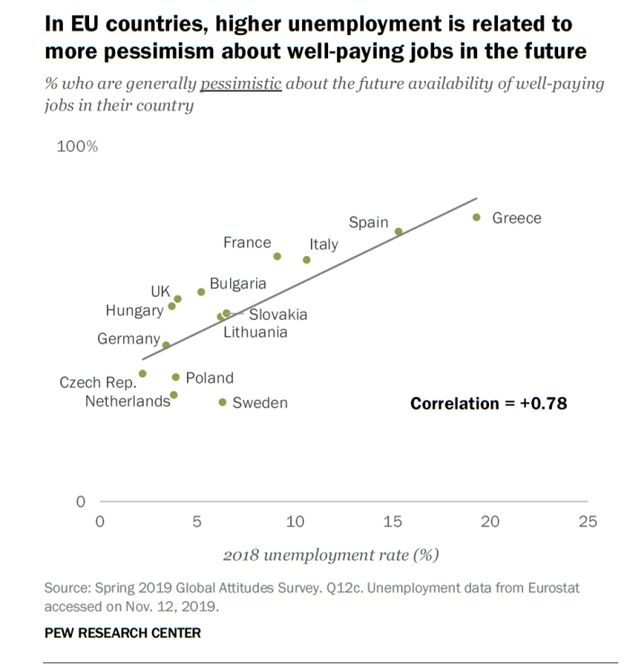Unemployed society, pessimistic society
“Unemployment remains a reality in several EU nations”, a study of Pew Research says, which relates it to pessimism in future expectations.
Pew Research · WASHINGTON D.C. · 28 MAY 2020 · 16:57 CET

European countries with higher unemployment rates “tend to voice more pessimism about future job prospects”, a Pew Research Center study shows.
The research collects data on the unemployment rate and the evolution of GDP growth in several countries of the continent.
“Across 14 EU nations surveyed by the Center this year, a median of 54% of adults say they are pessimistic about the future availability of well-paying jobs in their country, ranging from just 28% who say this in Sweden to 76% in Spain and 80% in Greece”, the study points out.
According to Pew, “these attitudes are connected with current economic conditions. The unemployment rate in Greece sat at 19.3% in 2018, while Spain had a rate of 15.3% in 2018. By comparison, the unemployment rate was much lower in Sweden (6.3%)”.
The research center says that there is also a correlation between facing a difficult economic situation and a pessimistic view of the opportunities of the new generations.
“It should be noted that unemployment may not take into account other factors that could lead to negative economic attitudes. For instance, more than 5% of the employed working-age population in Spain, Greece and France were underemployed part-time workers in 2018”, they underline.
Likewise, “roughly 2% of people ages 15 to 74 in the EU were available for work in 2018 but not actively seeking employment, which would exclude them from the overall unemployment count”.
Southern Europe, more pessimistic
Greece, Spain and Italy are at the forefront of the pessimistic vision, according to the data collected by Pew. For example, these three countries recorded youth unemployment rates in 2019 ranging from 33% to 28% respectively.
“In these three nations, only about a quarter of adults believe that when children in their country grow up, they will be better off financially than their parents”, the study says.

Meanwhile “at the other end of the spectrum, people in the Czech Republic and Germany, where youth unemployment is much lower, are more optimistic about the financial prospects of the next generation”.
In Greece, 85% of the adults surveyed consider that the economic situation is bad, while in the Netherlands they barely exceed 10%.
The evolution of GDP growth also affects the vision of what life will be like for the next generations. In the countries of the EU with the lowest annual growth between 2003 and 2018, such as Greece and Italy, six out of ten adults think that their descendants will have worse financial conditions.
These economic conditions could tighten if the forecasts of institutions such as the International Monetary Fund, which has calculated a 3% drop in the global economy as a result of the coronavirus, are met.
Morales: “Idolatry to growth and profit has increased the gap between countries”
Amable Morales, a Spanish Economist and treasurer Evangelical Alliance in that country, recently told Evangelical Focus in an interview: “Idolatry to growth and profit has increased the gap between rich and poor countries and has multiplied the number of millions of people who do not achieve a decent life”
“This crisis should make us reflect on the fragility of our existence and the impossibility of ensuring our future, even the immediate one”, he added.
Published in: Evangelical Focus - life & tech - Unemployed society, pessimistic society
